Ghana and the rosewood curse
 When the final stock is eventually taken, the illegal logging of rosewood would be found to have left a deep scar on Ghana and mostly its vulnerable people and communities. The level of illegal logging of the precious tree species for export has left a gaping hole in the Savannah forests of the country’s northern regions, largely poor and far behind on the development index.
When the final stock is eventually taken, the illegal logging of rosewood would be found to have left a deep scar on Ghana and mostly its vulnerable people and communities. The level of illegal logging of the precious tree species for export has left a gaping hole in the Savannah forests of the country’s northern regions, largely poor and far behind on the development index.
Ghana – a country at the verge of so many possibilities; economic growth, human development and social cohesion, but also in downward spiral. The country is endowed with so many natural resources; gold, iron ore, cocoa, oil, timber species, including rosewood, but her people living in areas where these resources abound are steeped in poverty, in need of ordinary potable water and decent living standards.
People of the regions of the North are bearing the brunt of the vicious rape of their natural resources. The Northern, Savannah and North East regions, were once one region, simply known as the Northern Region. It was the largest region in the country. But after a referendum in December 2018, the region was split into three in 2019.
The regions once had large reserves of rosewood, but not anymore. The rosewood trees in these regions are practically gone – from farmlands to forest reserves, greedy wood merchants, with the backing of some public officials and political appointees, using subterfuge, deceit and clout have ravaged the regions’ Savannah lands and plucked out every available rosewood; including trees with diameters so small that they aren’t good for export.

Other tree species such as the pauper, have also been targeted.
“Considering the fragility of the ecosystem, a lot more needs to be done to preserve the forests. So far, the forest resources are not well managed,” says Godwin Evenyo Dzekoto, Project Manager of environmental activist group, Arocha.
“With some 80 per cent of citizens involved in farming, more must be done to preserve the forest resources. Women who pick shea fruits are affected too,” he adds.
Suweidu Abdulai, is the Monitoring & Evaluation and Resource Officer of the Ghana Developing Communities Association (GDCA) based in Tamale. He believes that the regions are no longer endowed with forests.
“The northern zone is a protected area, and the Timber Act doesn’t allow commercial logging in the zone. The activities of loggers are contributing to desertification. Rosewood fixes nitrogen in the soil, oil can be extracted from it and the wood has medicinal uses. Rosewood bark is also used for dyeing smock, and can be used for mortar and pestle,” he says.
According to Abdulai, during the ban on logging of rosewood in the region, permits were still being issued for salvages, “and the permits were used as cover to harvest wood,” he said.
Different governments have announced bans, lifted them and re-announced bans so many times that one would lose count of them. But despite the bans and public announcements to stop the rampaging of the fragile forests of the Savannah, the rape of the forests have continued.
The chief of Tantalaa in the Mamprugu Magduri District, Masangya Asuma acknowledges the benefits of forests and trees. He believes that lack of trees also predisposes the community to diseases.
“We get food, shea, dawadawa and honey from the trees,” he says.
But he is also of the view that population increase is accounting to forest loss, as people are farming, building houses, burning charcoal, harvesting rosewood and pauper trees.
The Chief of Gorba, Mahamadu Nantogma says the loggers come all the way from Accra without any documents to cut trees in the community. “Now only smaller rosewood trees are left in our forests. The land was more fertile when there were a lot more trees,” he says, arguing further that when trees are cut, some should be planted.
Two weeks of investigation, traversing the farmlands, trails, villages and reserves in Damongo, Kpri, Bole, Tailorpe, and Mole in the Savannah region, Yagaba, Tantalaa, Gorba and Kubori in the North East, there are visible signs everywhere of impacts of climate change on farms and lives, poor rains leading to failure of cowpea and other crops – leaving in their trail disappointment and hopelessness for subsistence farmers and households. Eviscerated and ravished, the forests look over-exploited, signs of slash and burn activities are everywhere as farmers prepare the sparse land and look forward hopefully to the rainy season so they can plant – while they wait for the harmattan season to pass.
“They brought people from Techiman, Kintampo and Kumasi with chainsaw to cut down trees, specifically rosewood. Until 2012, we didn’t realize they were cutting rosewood. They are now entering the Mole National Park. They have cut down almost all rosewood in the area,” says the Youth Chief of Damongo, Yakubu Jarga.
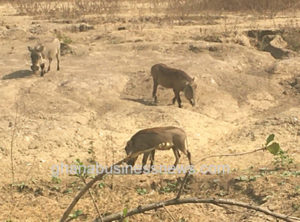
The Mole National Park and its surrounding areas, serve as an important corridor for the country’s protected hippo population.
But officials of the Mole Park declined to speak when contacted, directing us to seek permission from Accra. The Park has been targeted, for rosewood specifically. Under-staffed, with a total number of about 200 employees, all of them trained as guards but not all involved in actual guard duties, the overworked and overstretched employees are expected to protect the 4,577km2 national park, but they are unable to effectively do so, they are unable to cover the length and breadth of the reserve holding protected species, among them, antelopes, elephants, warthogs, royal pythons, buffaloes and hippos, exposing the resources to loggers and poachers, who are often lucky to get away. Sometimes, the authorities get lucky and intruders are arrested and prosecuted. But they don’t often get lucky, and sometimes when they do arrest offenders, they receive orders ‘from above’ to release them.
Use of deceit to harvest trees
Wood merchants use every available trick in their sleeves, including deceit to get access to rosewood trees and cut them for export. In one case, we found that they used a hospital invoice as a permit.
“In Kafalba in the East Gonja District, a hospital invoice was used to fool a local chief, and the entire forest in that community was cut,” says activist, Jeremiah Seidu of the Jack Sally Development Association, an environmental protection organization.

“Even more worrying,” says Seidu, “is the fact that when communities arrest and impound trucks loaded with rosewood, they simply go to the Forestry Commission to pay a fine and the trucks are released. Sometimes individuals with political influence step in and ask for their release.”
Loggers also approach communities with salvaging permits, but they fell fresh trees which they haul to the Tema Harbour for export, mostly to China. Available records show that China is the leading destination for rosewood from these parts of the country.
And curiously, export figures show that there is massive under-invoicing of rosewood exports to China. The export figures recorded from Ghana are lower than the import figures reported in China. The records from Ghana show that between 2010 and 2018, 506,199 cubic metres of wood was exported to China, but the Chinese records show that the country imported 953,827 cubic metres from Ghana, leaving an unaccounted 447,628 cubic metres of rosewood. While the country appears to be earning from the export, the communities from which the trees are logged don’t get much.
Local youth felt cheated
According to Jarga, the youth of Damongo, who naturally would protect their community and environment, felt powerless in the face of the surging pillage. Feeling cheated, when they couldn’t make more money from loggers, they decided to join the trade.
“The youth felt cheated,” says Chief Jarga, “they started demanding higher payments from wood buyers before they would allow them passage. But the buyers refused and so some joined the trade. However, in 2017, the youth approached me and asked that we stop the wood buyers. The Gonja Youth Association approached the Overlord of Gonja. They spoke to the District Chief Executive who agreed and a ban on rosewood felling was imposed,” he added.
A clear example of failure of the State – the youth of Gonja took it upon themselves to halt the plunder – their decision given bite by the respected leader of the Gonjas – effectively indicating that the national ban failed to stop the illegal logging.
Chief Jarga said they convinced other youth in other areas and villages like Busunu, Larbanga and Kabankpe to join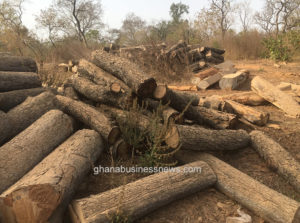 the campaign to halt the uncontrolled logging of rosewood in the areas.
the campaign to halt the uncontrolled logging of rosewood in the areas.
“The youth of Daboya didn’t join the campaign initially, but they later did,” he said.
But then the loggers soon found a big loophole which they exploited; the Damongo chieftaincy dispute that arose in 2018. The dispute brought division among the people.
“The dispute affected cohesion and the youth looked the other way while the logging resumed,” Jarga recalled.
Impact of logging on climate
In addition to climatic conditions, the communities started suffering social problems as well. As the trees are removed, signs of climate change showed up. Water bodies in the communities are drying up, and so are dams.
Chief Jarga vividly remembers an incident a day after Easter in 2014.
“A storm ripped off the roofs of buildings – something uncommon in these areas. We also started experiencing armed robbery, a menace unknown here. The youth had tasted excessive money from the rosewood business. But now they can’t make that much money and so they resorted to crime,” he added.
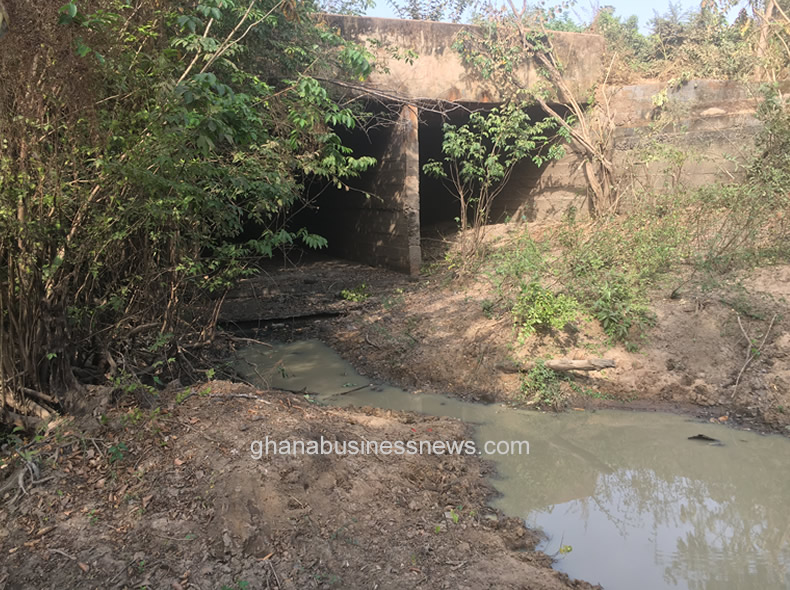
We trekked to the Kpri river, over which a bridge has been built, we found it drying up, and lying not far from the banks of the now vanishing river are felled rosewood that couldn’t be exported because loggers for some reasons among others, the smaller girth sizes, couldn’t move them. We counted some 300 logs wasting away!
The impact is being felt even on local diets, says Rev. Fr. Clement Aapengnuo of the Centre for Conflict Transformation and Peace Studies in Damongo.
“The indiscriminate felling of trees is affecting the rainfall pattern. We are losing the windbreak function of trees and local people can’t find honey anymore,” he said.
He adds that the rainfall pattern has changed; the communities are now experiencing heavy winds, because the wind-break function of the trees isn’t there.
The Murugu community that depended so much on honey harvesting can’t harvest honey in recent times, according to Rev. Aapengnuo. “The people are now beginning to see the linkage between trees and honey,” he added.
Damongo used to export maize to Angola
Chief Abdallah Ahmed, alias Chief Mornor, the traditional ruler of Tolodonpey in the Buipe Traditional Area recalls that in the 1970s Damongo used to produce maize and export to Angola.
There was the Gonja Development Corporation that managed a silo that was efficiently used to store maize. But the silo at some point was abandoned. Even though it was recently renovated with funding from the African Development Bank it has been abandoned again and it is empty.
“Sometime ago, residents of Damongo used to buy wood from Techiman to roof their buildings. But these days wood is sold to Techiman from Damongo,” he pointed out.
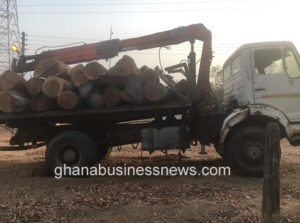
The construction of the Fufulso-Sawla road opened up the area to rosewood logging in Damongo, Chief Ahmed said. Construction of the 145km Fufulso-Sawla road started in 2012 and was commissioned in 2015. Costing $166 million, the road which joined the regions of the north to the Upper West region was funded with a loan from the African Development Bank.
“Because the logging was uncontrolled, a rise in charcoal burning entered the fray,” says Chief Ahmed.
As any available tree species became a target of wood hunters, the communities became exposed to the elements of the weather.
“The high volumes of trees cut in the communities started showing in the pattern of storms. And local people believe the level of deforestation is causing storms to hit the communities. But the youth have benefited from the rosewood trade. Some have built houses, bought trucks and cranes,” says Chief Ahmed, adding, “an illegality was converted into legal. The youth became accustomed to the phenomenon of ‘quick money,’ and many abandoned farming to enter the rosewood trade,” he says.
Meanwhile, there is no policy around charcoal burning, leaving the field to all kinds of activities.
Paul Hinneh is the Assistant District Manager of the Forestry Commission in Bole. The district is responsible for the Yerada and Kenikeni Reserves, but with only 10 forest guards and two range supervisors, they are outnumbered and overwhelmed by the activities of potential loggers and poachers, and often they are compelled to look above their shoulders with concern over interference from political and traditional leaders, as a result of which they are unable to do as much as they can and should, to protect the forests from the marauding loggers.
A tractor used for carting logs has been arrested and it has been sitting on the compound of the Commission for almost two years, as officials refuse to budge in this instance to release the tractor to the offenders.
Despite the difficulties, two loggers who were arrested by the team recently, have been successfully prosecuted and jailed, Hinneh says.
“Sometimes, when we arrest the trucks carrying the wood, we make them pay and we release them,” he adds.
Interference from state officials
At the height of the logging, local people decided to stop the loggers from moving logged trees from the communities. But each time they stopped trucks from transporting logs, they would receive calls from state officials to let them go.
While local people are flouting the laws and exploiting the forests themselves, interference from political office holders also played a role in deepening the problem of logging.
“You will be here and people will come with permits and letters from Accra. Sometimes, you would see trucks with military escort. In such cases, what can you do?” Chief Jarga asks.
Asked why he thinks the logging has persisted in spite of the known side effects and impacts, Abdulai says there are many people who don’t know the impacts of logging on the environment.
He however adds, “logging affects economic activities and should therefore be done legally to generate revenue, instead of illegally. It is going on because community members and chiefs are involved, and government is not strongly committed to ending the practice,” he said.
He adds that the government should specifically pass a law to protect rosewood.
“You will be here and people will come with permits and letters from Accra. Sometimes, you would see trucks with military escort. In such cases, what can you do?” Chief Jarga asks.
A classic case in point was when a Chinese national was arrested as she carted rosewood out of the Northern Region. In May 2019, the Northern Regional Police Command arrested 43-year-old Helen Huang for transporting two trucks loaded with four 20-footer containers of rosewood heading to the port city of Tema for possible onward export to China. While everyone expected her criminal prosecution, there is no final word on the case. The Ghanaian who stood surety for her, Mohammed Bondirigbum was briefly arrested and later acquitted by the courts.
There are unanswered questions about the whereabouts of the trucks and their contents – the rosewood she was smuggling.
The police in Damongo about a month ago arrested a crane carrying logged pauper trees. The truck was still sitting in the yard of the District Police at the time we visited. An officer who confirmed to us that the truck was arrested said, they are warding off interference from public officials and politically connected individuals to release the truck to the owners.
Investigation following report by EIA
Last year the Environmental Investigation Agency (EIA) conducted an investigation into the activities of rosewood loggers and established that there is official collusion. The Executive Director of the Wildlife Division of the Forestry
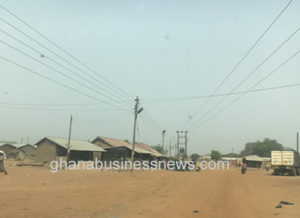
Commission was named in the investigation as receiving a percentage of the value of the rosewood exported illegally, and the investigation said he was being bribed to sign export permits illegally. He denied the accusations, and the Ministry of Lands and Natural Resources set up a committee to look into the allegations.
On December 23, 2019, the Committee submitted its findings to the Minister, Kwaku Asomah Cheremeh. The findings are yet to be made public, but the official, some sources say is very likely to be cleared – following a common trend in Ghana.
The woodcutter
Not far from Busunu, is the small village of Tailorpe, nestled in the corner of the Fufulso-Sawla road. Mainly a farming community, the locals also became introduced to the logging business. Fuseini Tahiru, (not his real name), says he used to farm, until he found a new vocation in cutting down trees for the wood merchants. Asked about his age, he says, he is either 35 or 36 years. He has three wives and 10 children.
“I will choose logging over farming. If farming is the only job there was, there would be lots of thieves and people would be in debt,” he argues.
“After farming for 20 years, I needed to do something else. I considered the income I could make from farming and from cutting down trees – particularly rosewood,” he says, with some wariness.
After purchasing a chainsaw, Tahiru started his trade. He would first identify a tree to be cut. Then he would inform the local chief or landowner.
“The landowner gets a share of income from every wood sold,” he says.
The trees have different prices, Tahiru says. According to him, depending on the tree species, they pay GH¢500 for 100 trees.
Asked if he didn’t think his activities were illegal, Tahiru said he didn’t think so, because he got permission from landowners and chiefs to log the trees, and he adds, “everyone was doing it”; that is cutting trees to sell.
“Compared to farming, which activity gives you more money,” we asked Tahiru.
Beaming with smiles, he said, “logging gives me more money. I have bought two cars.”
He followed up with a grim truth, however. “We have finished cutting all the pauper trees. You can’t find pauper in the forest. As for rosewood, we don’t cut anymore, because of the ban,” he said.
Even though he says he has been arrested thrice in the past, he said he paid his way out of any criminal prosecution.
He told a story of how a truck they had loaded with rosewood last year was arrested and the key seized by officials of the Forestry Commission, but the owner of the truck managed to recover the truck with the logs.
“Twice I have been arrested by Forestry Commission officials. I said they were looking for their daily bread, so I paid them money and they released me,” he said. Asked if receipts were issued for the payment, he said “no.”
Meanwhile, his chainsaw is not licensed.
Tahiru is however hopeful that in the future, the ban will be lifted and more rosewood would grow in the forest as he knows where to find the trees.
“Now I am back into farming. I farmed 19 acres and harvested 10 bags of maize,” he says.
Tahiru however, knows that cutting trees has negative impacts on the land and crop yield.
“There is overgrazing by cattle, the soil is degraded and crop yields are low as a result of cutting trees,” he admits, however he added, “I will choose logging over farming. If farming is the only job there was, there would be lots of thieves and people would be in debt,” he argues.
While he makes as much money as he can from cutting all the precious trees he could find, Tahiru thinks that at the current rate of logging, his children may grow up and not see any of the species of trees he is logging away.
We sent a written letter to the CEO of the Forestry Commission seeking responses to the issues, but we have not received a reply as at the time of publishing.
By Emmanuel K. Dogbevi
Copyright ©2020 by Creative Imaginations Publicity
All rights reserved. This article or any portion thereof may not be reproduced or used in any manner whatsoever without the express written permission of the publisher except for the use of brief quotations in reviews.
